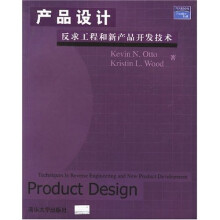产品设计:反求工程和新产品开发技术

目 录
Foreword
Preface
Charter 1: Journeys in Product Development
1.1 Chapter Roadmap
1.2 An Introduction to Product Design
1.3 Modern Prduct Development
1.4 Examples of Product Development Processes
1.5 Theories and Methodologies in Desgin
1.6 Summary and “Golden Nrggets”
Chapter 2:Prduct Development Process Tools
2.1 Chapter Roadmap
2.2 Prodrct Development Teams
2.3 Product Development Planning
2.4 Sumary and “Golden Nuggets”
Chapter 3: Scoping Product Developments: Technical and Business Concerns
3.1 Chapter Roadmap
3.2 Determining What to Develop
3.3 Basic Method:Mission Statement and Tenchnical
3.4 Adavced Method:Business Case Analysis
3.5 Advanced Method:Design Drivers
3.6 Summary and “Golden Nuggets”
Chapter 4 : Understanding Customer Needs
4.1 Chapter Roadmap
4.2 Customer Satisfaction
4.3 Gathering Customer Needs
4.4 Organizing and Prioritizing Customer Needs
4.5 Summyary and “Golden Nuggets”
Chapter 5: Establishing Product Function
5.1 Chapter Roadmap
5.2 Why Functional Decompodition?
5.3 Modeling Process
5.4 A Simpld Approach:Function Trees
5.5 Establishing Systeb Functionality:Creating a unction Structure
5.6 Augmentation:From Simple Function Trees to Compsete Models
5.7 Aggregation Revisited:Simplicity of Shooting Darts
5.8 A Functional Common Basis
5.9 Critique of Functional Modeling Megthods
5.10 Summary and “Golden Nuggets”
Chaper6: Product Teardown and Experimentation
6.1 Chapter Roadmap
6.2 Teardown Process
6.3 Teardown Methods
6.4 Post Teardown Repouting
6.5 Applications of Product Teardown
6.6 Summary and “Golden Nuggets”
Chapter 7: Benchmarding and Establishing Engineering Specifications
7.1 Chapter Roadmap
7.2 Bacdground:Know Your Enemy to Know Yourself
7.3 A Bechmarking Approach
7.4 Support Tools for the Bebchmarkng Process
7.5 Setting Product Specifications
7.6 Summaua and “Golden Nuggets”
Chapter 8:Product Portfolios and Portfolio Architecture
8.1 Chapter Roadmap
8.2 Product Portfolio Architecture
8.3 Choosing an Architecture Type
8.4 Platform Architecture
8.5 Summary and “Golden Nuggets”
Chapter 9: Product Architecture
9.1 Chapter Roadmap
9.2 Product Architectures
9.3 Product Modularity:Background
9.4 Modular Design:Basic Clustering Method
9.5 Moeular Desingn:An Advanced Functional Method
9.6 Architecture-Based Development Teams
9.7 Summary and “Golden Nuggets”
Chapter 10:Generating Concepts
10.1 Chapter Roadmap
10.2 Concept Generation Process
10.3 Basic Methods:Information Gathering and
10.4 Advanced Methods:Directed Search
10.5 Morphological Analysis
10.6 Combinig Solution Principles (Comept Variants)
10.7 Summary and “Golden Nuggets”
Chapter 11: Concept Selection
11.1 Chapter Roadmap
11.2 Introcuction
11.3 Estimating Techmical Feasibility
11.4 A Concept Selection Process
11.5 A Basic Method:Pugh Concept Selection Charts
11.6 Advanced Discussion :Measurement Theory
11.7 Advanced Method:Numerical Concept Scoring
11.8 A Critique of Design Evaluqtion Schemes
11.9 Chapter Summary and”Golden Nuggets”
Chapter 12: Concept Embodiment
12.1 Chapter Roadmap
12.2 Overview and Context
12.3 Basic Methods:Refining Geometry and Layout
12.4 Advanced Methodes:Systems Modeling
12.5 Case Study:Computer Monitor Stand for a Docking
12.6 Summary and “Golden Nuggets”References
Chapter 13: Modeling of Prduct Metrics
Chapter 14:Design for Manufacture and Assembly
Chapter 15:Design for the Environment
Chapter 16:Analytical and Numerical Model Solutions
Chapter 17:Physical Prototypes
Chapter 18:Physical Models and Experimentation
Chapter 19:Design For Robustness
Appendices
Preface
Charter 1: Journeys in Product Development
1.1 Chapter Roadmap
1.2 An Introduction to Product Design
1.3 Modern Prduct Development
1.4 Examples of Product Development Processes
1.5 Theories and Methodologies in Desgin
1.6 Summary and “Golden Nrggets”
Chapter 2:Prduct Development Process Tools
2.1 Chapter Roadmap
2.2 Prodrct Development Teams
2.3 Product Development Planning
2.4 Sumary and “Golden Nuggets”
Chapter 3: Scoping Product Developments: Technical and Business Concerns
3.1 Chapter Roadmap
3.2 Determining What to Develop
3.3 Basic Method:Mission Statement and Tenchnical
3.4 Adavced Method:Business Case Analysis
3.5 Advanced Method:Design Drivers
3.6 Summary and “Golden Nuggets”
Chapter 4 : Understanding Customer Needs
4.1 Chapter Roadmap
4.2 Customer Satisfaction
4.3 Gathering Customer Needs
4.4 Organizing and Prioritizing Customer Needs
4.5 Summyary and “Golden Nuggets”
Chapter 5: Establishing Product Function
5.1 Chapter Roadmap
5.2 Why Functional Decompodition?
5.3 Modeling Process
5.4 A Simpld Approach:Function Trees
5.5 Establishing Systeb Functionality:Creating a unction Structure
5.6 Augmentation:From Simple Function Trees to Compsete Models
5.7 Aggregation Revisited:Simplicity of Shooting Darts
5.8 A Functional Common Basis
5.9 Critique of Functional Modeling Megthods
5.10 Summary and “Golden Nuggets”
Chaper6: Product Teardown and Experimentation
6.1 Chapter Roadmap
6.2 Teardown Process
6.3 Teardown Methods
6.4 Post Teardown Repouting
6.5 Applications of Product Teardown
6.6 Summary and “Golden Nuggets”
Chapter 7: Benchmarding and Establishing Engineering Specifications
7.1 Chapter Roadmap
7.2 Bacdground:Know Your Enemy to Know Yourself
7.3 A Bechmarking Approach
7.4 Support Tools for the Bebchmarkng Process
7.5 Setting Product Specifications
7.6 Summaua and “Golden Nuggets”
Chapter 8:Product Portfolios and Portfolio Architecture
8.1 Chapter Roadmap
8.2 Product Portfolio Architecture
8.3 Choosing an Architecture Type
8.4 Platform Architecture
8.5 Summary and “Golden Nuggets”
Chapter 9: Product Architecture
9.1 Chapter Roadmap
9.2 Product Architectures
9.3 Product Modularity:Background
9.4 Modular Design:Basic Clustering Method
9.5 Moeular Desingn:An Advanced Functional Method
9.6 Architecture-Based Development Teams
9.7 Summary and “Golden Nuggets”
Chapter 10:Generating Concepts
10.1 Chapter Roadmap
10.2 Concept Generation Process
10.3 Basic Methods:Information Gathering and
10.4 Advanced Methods:Directed Search
10.5 Morphological Analysis
10.6 Combinig Solution Principles (Comept Variants)
10.7 Summary and “Golden Nuggets”
Chapter 11: Concept Selection
11.1 Chapter Roadmap
11.2 Introcuction
11.3 Estimating Techmical Feasibility
11.4 A Concept Selection Process
11.5 A Basic Method:Pugh Concept Selection Charts
11.6 Advanced Discussion :Measurement Theory
11.7 Advanced Method:Numerical Concept Scoring
11.8 A Critique of Design Evaluqtion Schemes
11.9 Chapter Summary and”Golden Nuggets”
Chapter 12: Concept Embodiment
12.1 Chapter Roadmap
12.2 Overview and Context
12.3 Basic Methods:Refining Geometry and Layout
12.4 Advanced Methodes:Systems Modeling
12.5 Case Study:Computer Monitor Stand for a Docking
12.6 Summary and “Golden Nuggets”References
Chapter 13: Modeling of Prduct Metrics
Chapter 14:Design for Manufacture and Assembly
Chapter 15:Design for the Environment
Chapter 16:Analytical and Numerical Model Solutions
Chapter 17:Physical Prototypes
Chapter 18:Physical Models and Experimentation
Chapter 19:Design For Robustness
Appendices
比价列表
| 商家 | 评价 (0) | 折扣 | 价格 |
 | 暂无 | 当当缺货N个月 |  6天前更新 |
公众号、微信群
 缺书网
缺书网微信公众号
 扫码进群
扫码进群实时获取购书优惠

